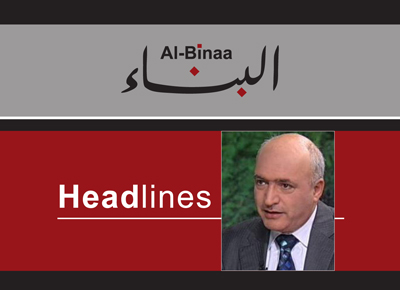Two Yemeni Missiles Target Tel Aviv and Ben Gurion Airport… Millions Seek Shelter / International, Regional, and Syrian Focus on National Dialogue Conference Structure, Mechanisms, and Outcomes
Hezbollah: Violations in the Hands of Agreement Stakeholders Until Day 60, Day 61 Will Be Different

December 31, 2024
The political editor wrote
Despite the blows Yemen has suffered and the joint U.S.-Israeli surveillance over Yemeni airspace and the Red Sea, Yemen launched two ballistic missiles deep into the occupying entity, targeting Tel Aviv and Ben Gurion Airport. Images shared on social media, captured by settlers’ phones, showed the massive missiles on the ground, raising serious questions about Israeli claims of successful interception. As in previous incidents, Ben Gurion Airport was shut down, and millions of settlers rushed to bomb shelters.
In Syria, the announcement of concrete steps toward a comprehensive National Dialogue Conference has garnered attention. Media close to the ruling authority in Damascus reported that the conference will include over a thousand representatives from all provinces and factions. Its outcomes are expected to feature the establishment of an advisory council to replace the current parliament, a transitional government succeeding the temporary one, and a committee of experts tasked with drafting a new constitution. Additionally, the conference will outline interim constitutional principles for the transitional phase and establish frameworks for political and personal freedoms.
As the first political initiative following the changes in Syria, the conference has attracted significant international, regional, and domestic interest. Observers are keen to assess the balance of representation within the conference, which is expected to reflect diverse public opinions across Syria. They are also scrutinising the mechanisms for voting and amending pre-drafted recommendations, as well as the nature of its outcomes – be it the government, the advisory council, or the constitutional committee. Attention is also focused on the redefined role and powers of the governing authority’s leader, including their authority over the army’s reconstruction and identity.
In Lebanon, several Hezbollah officials, including Deputy Head of the Executive Council Sheikh Ali Daamoush, Deputy Head of the Political Council Minister Mahmoud Qomati, and party MPs, addressed Israeli violations of the ceasefire agreement. Their statements emphasised a shared stance: the repeated and escalating Israeli breaches have been referred to the agreement’s stakeholders, including the government, army leadership, UNIFIL, and the Monitoring and Oversight Committee. They underscored that restoring adherence to the agreement’s terms is fundamentally the responsibility of these parties until the 60-day deadline for full Israeli withdrawal from Lebanese territories. Should this withdrawal fail to materialise, Day 61 will mark a turning point, with the resistance prepared to assume its responsibilities without hesitation.



